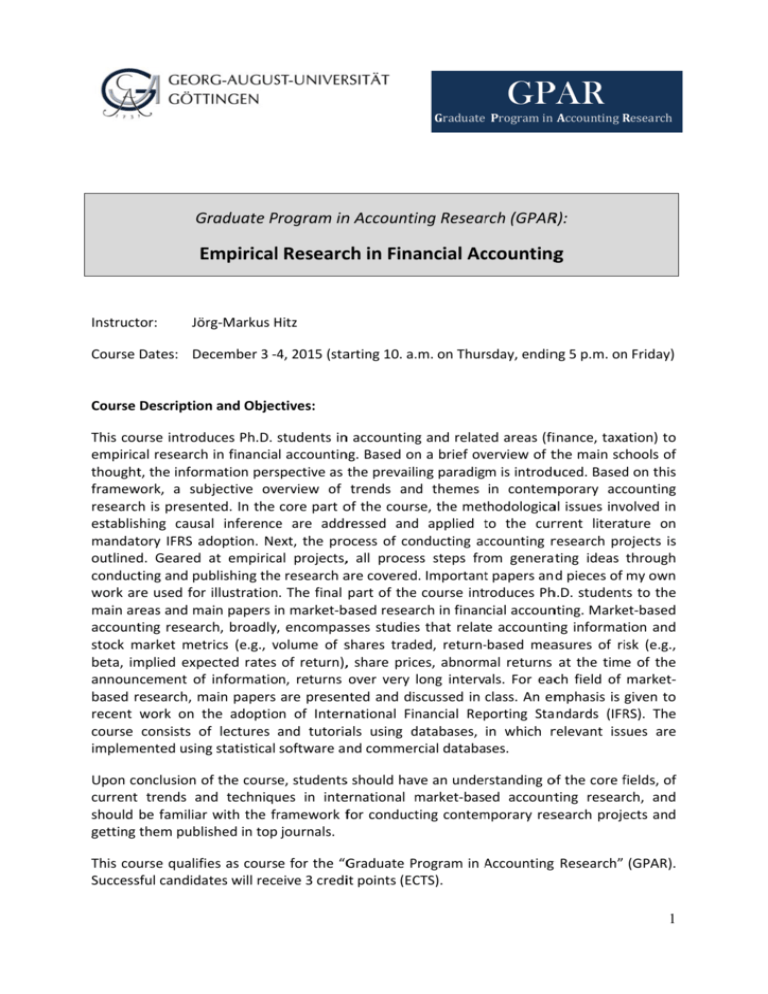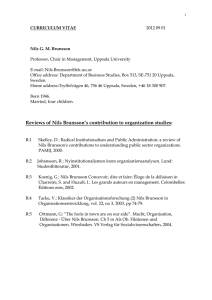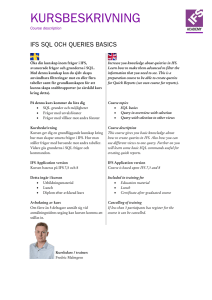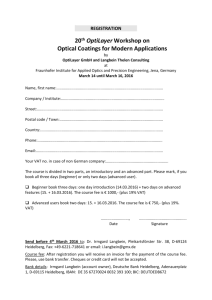Empirical Research in Financial Accounting
advertisement

GP PAR Graduate Programin AccountingR Research Grraduate P Program inn Accountiing Researrch (GPARR): E Empirical Researcch in Fina ancial Acccountingg Instructtor: Jörrg‐Markus H Hitz Course Dates: Deecember 3 ‐4 4, 2015 (staarting 10. a..m. on Thurrsday, endinng 5 p.m. on n Friday) Course Description n and Objecctives: This cou urse introdu uces Ph.D. students inn accountingg and relate ed areas (fiinance, taxaation) to empirical research in financial accountinng. Based on n a brief ovverview of tthe main scchools of mation persspective as the prevailing paradigm is introduuced. Based d on this thoughtt, the inform framew work, a sub bjective overview of trends and themes in contem mporary acccounting research is presented. In the core part oof the coursse, the metthodologicaal issues invvolved in establishing causaal inference e are addrressed and d applied to t the currrent literature on mandattory IFRS ad doption. Ne ext, the proocess of conducting acccounting rresearch projects is outlined d. Geared at empiricaal projects,, all processs steps fro om generatting ideas through conductting and publishing the e research aare covered d. Importantt papers an d pieces of my own work arre used for illustration. The final part of the e course introduces Phh.D. studentts to the main arreas and maain papers in market‐bbased research in financial accounnting. Marke et‐based accountting researcch, broadly,, encompassses studiess that relate accountinng informattion and stock m market metrics (e.g., volume v of sshares trad ded, return‐‐based meaasures of riisk (e.g., beta, im mplied expeected rates of return),, share pricces, abnorm mal returns at the time of the announcement of informatio on, returns over very long intervals. For eacch field of market‐ based rresearch, m main papers are presennted and discussed in class. An em mphasis is given to recent work on the adoptio on of Internnational Fin nancial Rep porting Staandards (IFR RS). The course consists off lectures and tutoriaals using databases, d in which rrelevant isssues are implemented usingg statistical software a nd commerrcial databases. Upon co onclusion o of the course, studentss should havve an understanding oof the core ffields, of current trends an nd techniqu ues in inteernational market‐bas m ed accountting researrch, and mporary ressearch proje ects and should be familiar with the frramework ffor conductting contem getting them published in top journals. This cou urse qualifiees as course for the “G Graduate P Program in A Accounting g Research” (GPAR). Successsful candidates will rece eive 3 crediit points (EC CTS). 1 Assessment: Assessment is based on participation in the course and hands‐on exercises during the database tutorial. Course Material and Readings: Participants will receive copies of the lecture slides. A reading list is given below. Students are expected to digest the required readings in preparation. Course Outline: I. Empirical Accounting Research – an Introduction II. Contemporary Issues and Opportunities in Empirical Accounting Research – A Personal View 1. Neo institutional accounting research 2. IFRS 3. Accounting research and standard‐setting 4. Competitive advantage III. The core: establishing cause and effect 1. A primer on IFRS adoption studies 2. Theory and empirical implementation 3. Identification and causal inference 3.1 Selection bias and the experimental ideal 3.2 Addressing endogeneity 3.3 Regression 3.4 Instrumental variables 3.5 Differences in differences Conducting Empirical Accounting Research Market‐based Accounting Research 1. The Beginning: Value Relevance and Information Content Studies 2. Earnings Response Coefficients 3. Association Studies 4. Accounting conservatism 5. Earnings Management 6. Cost of Capital 7. Studies on IFRS adoption Database Tutorial IV. V. VI. Registration Via Email to ann‐kristin.grosskopf@wiwi.uni‐goettingen.de. 2 Reading list (Boxes indicate required readings) I. Empirical Accounting Research – an Introduction Kothari. S. P. (2001): Capital markets research in accounting, Journal of Accounting and Economics, Vol. 31 (2001), pp. 108‐121. Ball, Ray, and Brown, Philip (1968): An Empirical Evaluation of Accounting Income Numbers, Journal of Accounting Research, Vol. 6, No. 2 (Autumn 1968), pp. 159‐178. Beaver, William H. (1998): Financial Reporting – An Accounting Revolution, 3rd edition, London 1998, chapter I. Holthausen, Robert W., and Watts, Ross L. (2001): The relevance of the value‐relevance literature for financial accounting standard setting, Journal of Accounting and Economics, Vol. 31 (2001), pp. 3‐75. Liang, Pierre Jinghong (2001): Recognition: An Information Content Perspective, Accounting Horizons, Vol. 15, No. 3 (September 2001), pp. 223‐242. Watts, Ross L., and Zimmerman, Jerold L. (1978): Towards a Positive Theory of the Determination of Accounting Standards, Accounting Review, Vol. 53, No. 1 (January 1978), pp. 112‐134. II. Contemporary Issues and Opportunities in Empirical Accounting Research – A Personal View Fülbier, Rolf‐Uwe, Hitz, Jörg‐Markus, and Thorsten Sellhorn: Relevance of academic research and researchers’ role in the IASB’s financial reporting standard setting, Abacus, Vol. 45, No. 4 (2009), pp. 455‐492. Wysocki, Peter (2011): New institutional accounting and IFRS, Accounting and Business Research 41, pp. 309‐328. Buijink, Willem (2006): Evidence‐Based Financial Reporting Regulation, Abacus 42 (3/4), pp. 296‐301. Ewert, Ralf, and Alfred Wagenhofer (2012): Using Academic Research for the Post‐Implementation Review of Accounting Standards: A Note, Abacus 48(2), pp. 278‐291. Holthausen, Robert W. (2009): Accounting Standard, Financial Reporting Outcomes, and Enforcement Journal of Accounting and Economics 47, pp. 447‐458. Soderstrom, Naomi S., and Kevin J. Sun (2007): IFRS Adoption and Accounting Quality: A Review, European Accounting Review 16:4, pp. 675‐702. 3 III. The core: establishing cause and effect Angrist, Joshua D., and Jörn‐Steffen Pischke: Mastering Metrics, Princeton University Press 2014, chapters 1‐3 & 5. Brüggemann Ulf, Hitz, Jörg‐Markus, and Sellhorn, Thorsten (2015): Ökonomische Konsequenzen der verpflichtenden IFRS‐Einführung in der EU – Teil 2: Welchen Beitrag kann die empirische Forschung leisten? Der Betrieb (2015), pp. 1849‐1855. Gassen, Joachim (2014): Causal Inference in Empirical Archival Financial Accounting Research. Accounting, Organizations and Society 39 (7): 535‐544. Larcker, David L., and Tjomme O. Rusticus (2007): Endogeneity and Empirical Accounting Research, European Accounting Review 16(1), pp. 207‐215. Larcker, David L., and Tjomme O. Rusticus (2010): On the use of instrumental variables in accounting research, Journal of Accounting and Economics 49, pp. 186–205. IV. Conducting Empirical Accounting Research James A. Ohlson (2011): On Successful Research, European Accounting Review 20(1), pp. 7‐26. V. Market‐based Accounting Research Kothari, Capital markets research in accounting, Journal of Accounting and Economics 31 (2001), pp. 121‐161. 4


